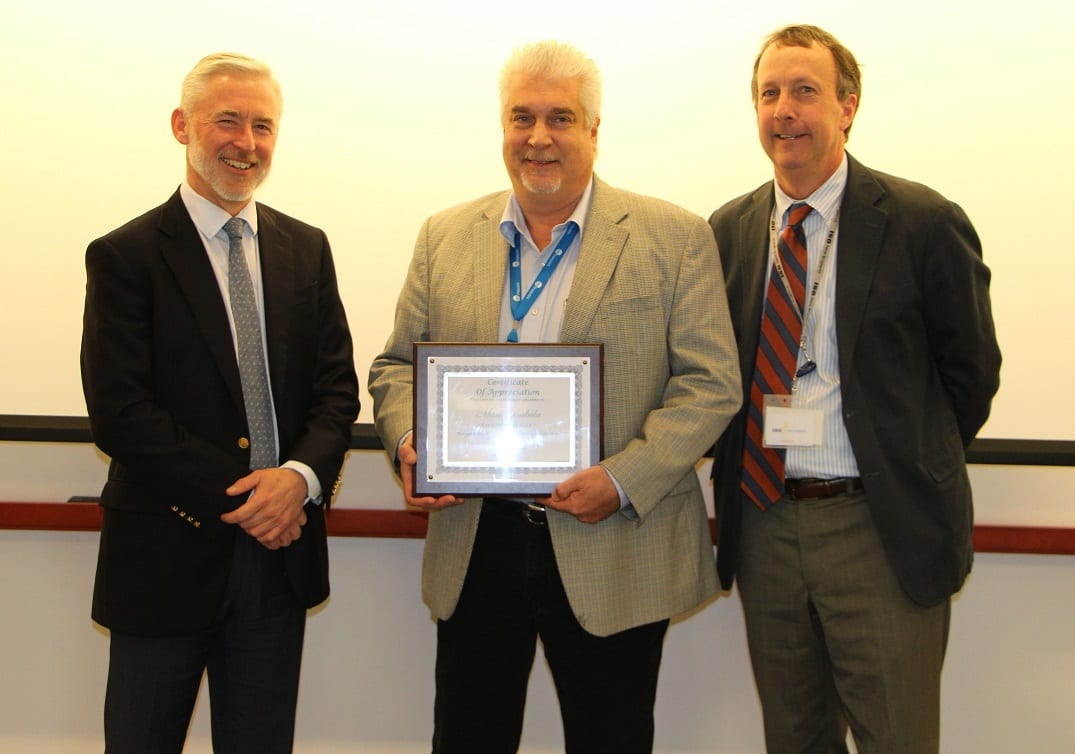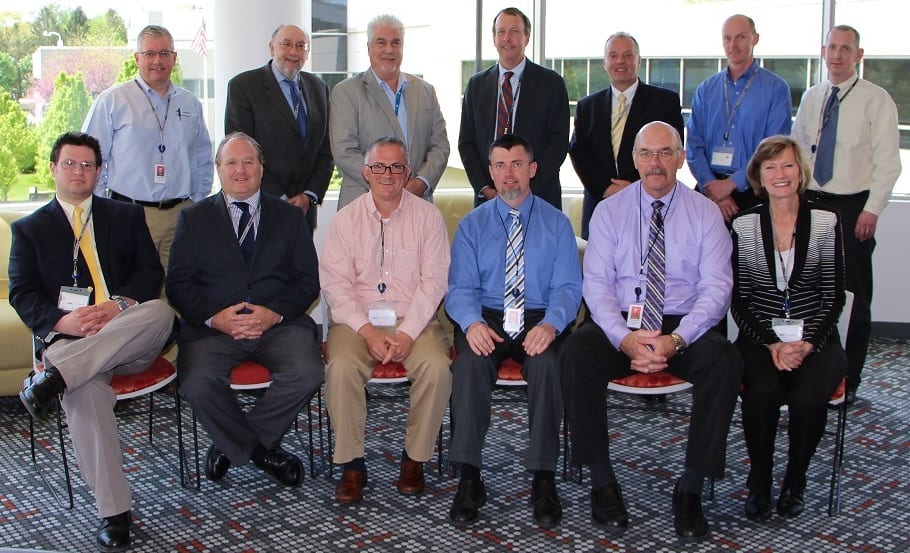Electric/Gas Operations Committee (EGOC) marks 50th meeting milestone
 The New England Electric/Gas Operations Committee (EGOC) last week marked a special milestone: its 50th meeting since the group was created 12 years ago by ISO New England and the Northeast Gas Association. The committee meets quarterly to review post-season operations and forecasts for the upcoming winter and summer peak seasons.
The New England Electric/Gas Operations Committee (EGOC) last week marked a special milestone: its 50th meeting since the group was created 12 years ago by ISO New England and the Northeast Gas Association. The committee meets quarterly to review post-season operations and forecasts for the upcoming winter and summer peak seasons.
|
EGOC participants over the last 12 years include a wide range of gas and electric industry representatives in New England:
|
The EGOC was formed after the region experienced a severe cold snap on January 14-16, 2004, and about 7,000 megawatts (MW) of gas-fired generation was unable to come online and produce electricity. New England’s natural gas pipeline infrastructure was built to serve the firm fuel delivery for residential and commercial space heating requirements, and power generators were unable to procure sufficient quantities of natural gas during the deep freeze.
“After the 2004 cold snap, there was a need to enhance the communications between the electricity and natural gas sectors, so the Electric/Gas Operations Committee was launched. Since then, we’ve worked closely on many issues to help maintain the reliability of New England’s power system,” said EGOC Co-Chair Mark Babula, an ISO-NE principal engineer.
The goal of the EGOC is to not only promote greater reliability of the regional electric and natural gas systems through improved education, understanding, communications, and coordination, but also to help prevent future energy emergencies.
Much progress has been made since that first meeting, said Babula. After its creation, the committee established cross-training of electric and gas system operators, developed emergency communications protocols and procedures, addressed system restoration issues, and routinely assessed the coordination of electric and gas system maintenance requirements.
Today, gas-fired power plants represent about 44% of New England’s electricity generating capacity and play a much larger role in the region’s power system, according to the ISO’s 2016 Regional Electricity Outlook (REO).
Through the committee’s work, New England is now leading the way nationally in terms of natural gas-electric coordination and best practices:
- ISO-NE shares daily forecasts of electric sector natural gas consumption with regional pipeline operators and provides them with the most recent generator maintenance schedules.
- Annual face-to-face meetings are held with regional gas control representatives and maintenance personnel to review and understand each pipeline’s annual maintenance schedule.
- Seasonal communications were increased through regular:
- Conference calls with Northeast Power Coordinating Council (NPCC) Reliability Coordinators, who can identify any upstream pipeline fuel constraints or limitations impacting neighboring electric systems such as NYISO, PJM and Ontario’s IESO.
- Communications with regional natural gas pipelines, local gas distribution companies (LDCs), and regional liquefied natural gas (LNG) suppliers.
- Review of scheduled natural gas deliveries on pipeline electronic bulletin boards (EBBs) for committed gas-fired generators.
- Winter preparedness seminars delivered online and in live training sessions.
- Information policy changes made at ISO-NE to improve gas-electric coordination.
In addition, ISO-NE Operations subscribes to various natural gas sector services to monitor gas supply and prices:
- Platts Gas Daily for national and regional gas sector news/prices.
- Intercontinental Exchange (ICE) for next-day and intra-day natural gas spot market bids/asking prices.
- Genscape gas pipeline flow information is checked routinely by ISO Control Room staff to retrieve scheduled volumes for gas power generators.
At the conclusion of the 50th meeting, Stephen Leahy, Northeast Gas Association Vice President of Policy & Analysis presented Babula with a certificate of appreciation, noting his dozen years of dedication and service to the group. Leahy and Babula co-chair the committee, which has grown to include participation from the New York ISO and the PJM Interconnection.
“I can’t believe it is meeting number 50. I appreciate all of the help you’ve given us over the years,” Babula told committee members.
The committee’s work is available on ISO New England’s website at: http://www.iso-ne.com/committees/industry-collaborations/electric-gas-operations
 Stephen Leahy, Northeast Gas Association Vice President of Policy & Analysis (right) presented Electric/Gas Operations Committee Co-Chair Mark Babula (center) with a certificate of appreciation from the association noting his dozen years of dedication and service to the group. At left is ISO New England President and CEO Gordon van Welie.
Stephen Leahy, Northeast Gas Association Vice President of Policy & Analysis (right) presented Electric/Gas Operations Committee Co-Chair Mark Babula (center) with a certificate of appreciation from the association noting his dozen years of dedication and service to the group. At left is ISO New England President and CEO Gordon van Welie.
 EGOC members attending the May 16, meeting were (from left to right in the back row): John Norden of ISO New England, Philip Fedora of the Northeast Power Coordinating Council (NPCC), EGOC co-chairs Mark Babula (ISO New England) and Stephen Leahy (Northeast Gas Association), Charlie Hanko of Exelon Corp., Sean Foley of Spectra Energy, and Steve Smith of Massachusetts Municipal Wholesale Electric Company (MMWEC). In the front row (from left to right) are: Brad Garrison, Wes Yeomans, and John Broyles of the New York ISO; Mike Knowland and William Callan of ISO New England; and Doreen Wrick of Spectra Energy.
EGOC members attending the May 16, meeting were (from left to right in the back row): John Norden of ISO New England, Philip Fedora of the Northeast Power Coordinating Council (NPCC), EGOC co-chairs Mark Babula (ISO New England) and Stephen Leahy (Northeast Gas Association), Charlie Hanko of Exelon Corp., Sean Foley of Spectra Energy, and Steve Smith of Massachusetts Municipal Wholesale Electric Company (MMWEC). In the front row (from left to right) are: Brad Garrison, Wes Yeomans, and John Broyles of the New York ISO; Mike Knowland and William Callan of ISO New England; and Doreen Wrick of Spectra Energy.
- Categories
- Inside ISO New England
